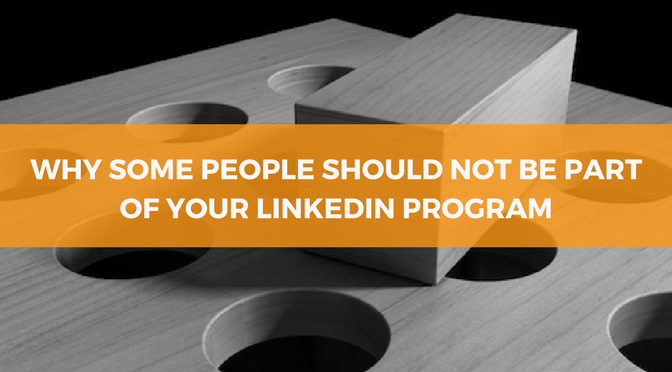Why some people should not be part of your LinkedIn program
Sometimes people are hesitant to embrace LinkedIn just because it’s new to them and sometimes people really don’t like it and aren’t going to. If you feel hesitancy in yourself or in one of your team members, the sooner you figure out which group they fall into, the better.
Individuals in the first group - those who are uncomfortable because it’s new - can often become LinkedIn power users with a little time and experience. In many cases you can help make these people more comfortable by showing them good examples of how others in their positions and age groups are using LinkedIn.
Individuals in the second group are a different story.
Once upon a time we had a client who was absolutely terrified to put any details other than his current company - of which he was the founder & CEO - on his LinkedIn profile. He was sure he was going to be the victim of identify theft. This person should never have been expected to take an active role in a LinkedIn program. He ended up there only because his VP of Sales, who was initially the public face of the program, left the company suddenly. We talked ourselves blue in the face trying to explain to him that LinkedIn did not have a conspiracy to steal his personal email address and employment history. It didn’t work.
In hindsight we should have paused the program the minute the CEO baulked at providing details on his profile. This was a clear signal that he was not going to be comfortable networking online.
It’s easy to say “buyers are going to be looking at you whether you want them to or not”, but that doesn’t make the extremely private person any more comfortable. Some personality types are not going to do well on LinkedIn - or any social media or possibly any place with the word “social” in it. And maybe they don’t need to. It’s best to move on without them.
Today’s key questions:
Do you have what it takes to participate on LinkedIn in a way that will help both yourself and your company? Are you willing to share what you know and how you know it?
What about your LinkedIn team? Are you asking anyone to move too far outside their comfort zone?
Need some help evaluating your team? Just contact us.

